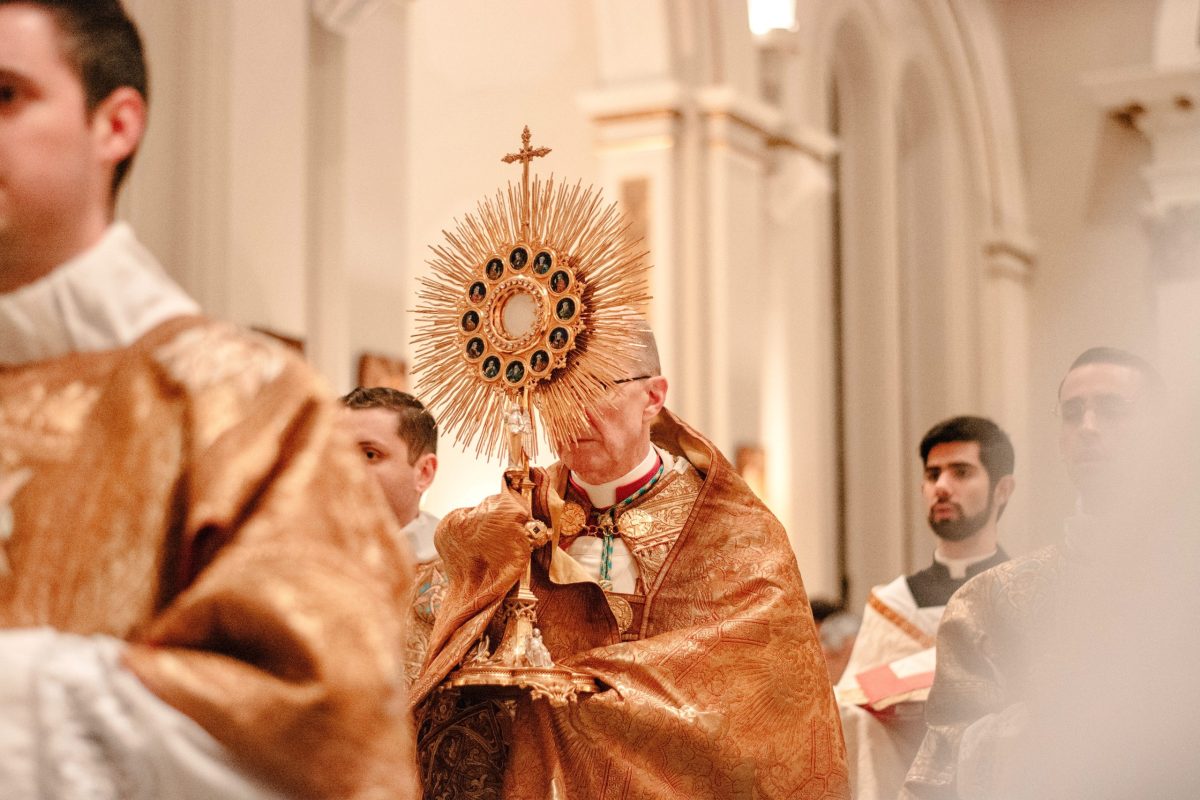By Amber Kinloch
If the Church possessing the mark of “One” seems contentious, how about her claim of a second mark: “Holy?”
By holy, we mean something that is set apart for the service of God, something that is not profane or ordinary. So, we speak of “holy vessels” (e.g., a chalic or ciborium) versus ordinary drinking glasses. Holy can also mean something perfect or righteous, such as a holy person.
But what about the Catholic Church teaching that holiness is one of her defining marks? What a bold claim! The Seventh-day Adventist I conversed with would certainly have some questions about this. She was confounded by the idea that a “nice young woman” would want to be a member of a church seemingly full of corrupt clerics who’ve engaged in sexual abuse. And what about all those Catholics who give scandal in more common ways by lying, losing their temper, gossiping, engaging in fornification, using foul language, etc., without a second thought?
One would think that members of a church that claims to be “holy” should live only the most exemplary of lives. The Amish, for instance, live separated from the world, working hard, dressed modestly, without any frivolous comforts. Now isn’t that an example of holiness? Most Catholics do not live up to this standard of virtue and detachment.
But, as before, we must clarify what we mean when we say that the Church is “holy.” According to the Baltimore Catechism No. 3: “The Catholic Church is holy because it was founded by Jesus Christ, who is all-holy, and because it teaches, according to the will of Christ, holy doctrines, and provides the means of leading a holy life, thereby giving holy members to every age.”
Let’s take a deeper look at what all this means.
Founded by Jesus Christ, i.e., God
The Catholic Church is uniquely a holy church not because all of her members are holy, but because her founder, Jesus Christ, is all-holy. Other world religions and Christian churches have been founded by weak, fallible men. But Jesus is God, as proven by His own words and miracles and the testimony of others. Being God, He is, by His nature, all-holy. There is no imperfection in what He does. Therefore, the Church He founded is holy, too, in virtue of His holiness.
Holy Doctrines
Various churches and religions claim to possess holy doctrines—and indeed, they possess varying measures of the Truth that God has distributed among all nations even though it’s in a hidden way (CCC 856). But only the Catholic Church, founded by Jesus Christ, possesses the fullness of the Truth. As such, she is also the only one capable of teaching with authority. Other churches and religions cannot. Inevitably, their teachings disintegrate over time because they do not teach according to the will of Christ.
By contrast, we see the Church holding fast to her doctrines. She might clarify her teachings as time passes and further knowledge comes her way, but the essence of them never changes. Why? Because what she teaches in accord with God’s will is holy, i.e., perfect and righteous. Her teachings come from God through various sources, notably Sacred Scripture and Tradition. These teachings are faith-filled and in accord with reason. They are unchanging, guiding us towards what is good and true. Men benefit by living in accord with these doctrines, even when it’s difficult or they don’t discern the “why” behind these teachings due to their limited faculties.
Take the doctrine of the Trinity. In studying this supernatural truth that there is one God in three divine Persons, we learn so many things. We realize, for instance, that God is not closed in on Himself; rather, the three Persons are always giving and receiving love among themselves. God is love, and we are invited to participate in this love with Him and others. Thus, a holy doctrine comes to have a definite impact on our lives.
It’s the same with every other doctrine the Church teaches—each one is holy and helps us to know, love, and serve God. In short, they help us to become holy, too.
The Means of Leading a Holy Life
The Catholic Church, as a holy church, provides people with the best means for attaining holiness. Through her liturgy and sacraments, God’s grace is richly poured out into people’s souls in accord with their capacity to receive it. Besides, the Church supplies us with other sources of grace: We have the saints and the Blessed Mother as spiritual friends and counselors. We have devotions such as the Rosary and Divine Mercy Chaplet. We have an immense library of spiritual writings, many of them written by saints.
Of course, one needn’t belong to the Catholic Church in order to receive grace. Just because God instituted the Church doesn’t mean He’s limited to using it exclusively. But He did institute the Church as the primary means of bringing people to Himself. Belonging to her is like being present at the mouth of a roaring river—you’re right at the source of things. By comparison, other churches are mere streams trickling off of this river.
Holy Members in Every Age
The wonderful thing about the Catholic Church is that she calls all people to holiness, without exception. In her saints, we see a vast range of people who answered this summons: clerics, religious, and laypeople; the young and the old, married couples and unmarried persons, from every century. There are innocent souls like St. Joan of Arc and firecrackers such as St. Elizabeth of the Trinity, as well as formerly great sinners like Bl. Franz Jägerstätter. Holiness is truly for everyone!
Despite this call to holiness, no members of the Church (except the Virgin Mary) are without sin. The Church supplies us with the means to achieve sanctity, but her members do not always make use of these means. We are all possessed of free will, and the Church respects our freedom. Thus, we find great sinners who persist in calling themselves Catholics despite leading scandalous and unrepentant lives.
Yet as we’ve seen, the Church remains holy because her holiness is bestowed by virtue of her Founder, not by sinful men. And while she suffers on account of her sinful members, that does nothing to taint her own intrinsic holiness. In fact, she embraces these wayward children of hers and does penance for their offenses (CCC 827), always holding out hope of bringing them to salvation. The Church does not exist to condemn sinners. She is here to help them become saints.
Next week, we’ll look at why the Church is Catholic. In the meantime, if you’d like to read more about why the Church is holy, check out the links below.
Further Reading
- “The Mark of Holiness” by Walter Jewell
- “On Your Marks: The Church is Holy” by Hector Molina
- “Don’t Forget the Second Mark” by Eric Sammons

Amber Kinloch
Amber writes from the bunker of her living room. There she hunkers down with her laptop and a blanket while keeping an eye and ear tuned in to the activity of family life. Music set on loop keeps her energy flowing as she muses on the deeper happenings of ordinary life and what food to restock the fridge with.






0 Comments